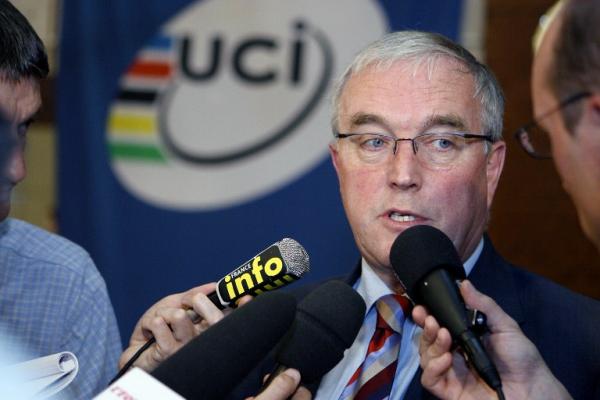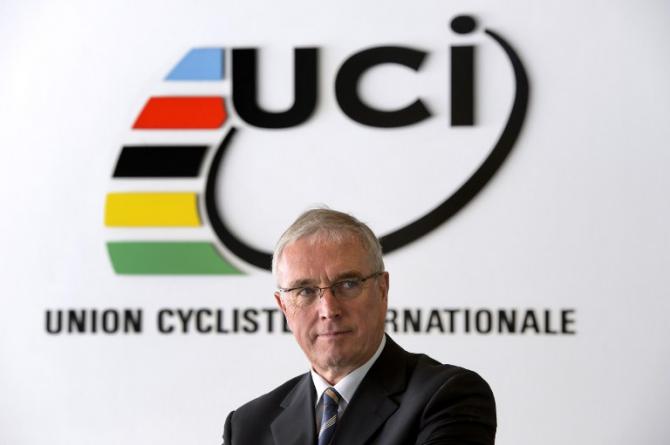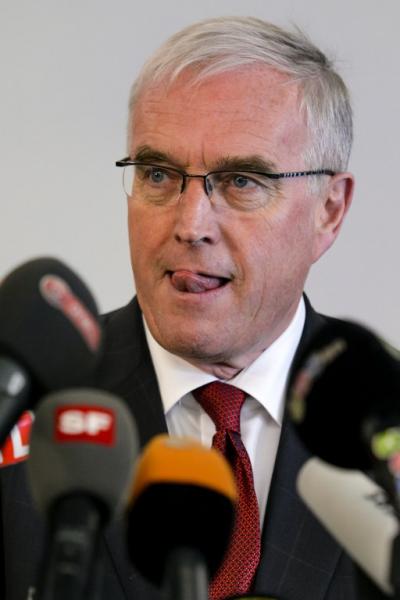Pat McQuaid: "Cycling has an extremely bright future"
Opinion piece on the results of the Stakeholders Consultation process



From Pat McQuaid:
Back in February, more than 6,300 people responded to the UCI’s request for feedback as part of its Stakeholders Consultation, A Bright Future for Cycling.
Five working groups were formed – covering the consultation’s four pillars of anti-doping, the cycling calendar, globalisation and riders – with more than 85 participants, including representatives from pro-cycling teams, riders, national federations, race organisers, cycling sponsors, scientific and legal advisors and journalists.
To read the UCI media clippings file from the past six months, an observer might have predicted that cycling’s governing body would be deluged by criticism in any exercise like that.
Not so! Today, the UCI publishes a summary report with key recommendations which we hope will lay the foundations for the future development of our sport.
The report details a great many positive responses from stakeholders about many aspects of the UCI’s performance. Our stakeholders recognised the enormous improvements made in anti-doping activities in recent years, in particular following the launch of the biological passport, which the UCI was the first International Federation to introduce and fully implement according to WADA guidelines.
The Cycling Family also affirmed that there was a very good day-to-day working relationship between the UCI and the sport that it serves – and they praised the UCI’s core role in helping to present cycling as an attractive and entertaining sport.
But the report, prepared by Deloitte, is certainly no whitewash. The stakeholder feedback also focused on a number of areas where the UCI can improve what it does.
The executive summary makes six ‘crucial’ recommendations to enable cycling to achieve its ‘bright future’:
- We must restore the credibility of cycling and the public perception of the sport;
- A decision needs to be made quickly whether to hold an independent inquiry into the Armstrong affair and whether to offer riders an ‘amnesty’ or reduced sanctions for coming forward to that enquiry;
- The UCI needs to develop a long-term strategic plan for cycling;
- We should further strengthen the anti-doping culture that already exists in the UCI;
- We need to improve our relationship with WADA; and
- We need to restructure the pro-cycling calendar.
The report summary also makes five additional ‘high-priority’ recommendations. They are:
- To increase the independence of the Cycling Anti-Doping Foundation (CADF);
- To appoint an independent anti-doping body to sanction professional riders caught doping;
- To review the existing points system for pro-teams;
- To focus on developing women’s cycling;
- To improve our communication with professional road riders.
It was extremely heartening to hear from the thousands of people who contributed to the Stakeholder Consultation that there is a great deal that the UCI is doing right. I am particularly pleased to note the respondents’ recognition for the UCI’s leading role in anti-doping activities. Despite what has been written to the contrary, for the past 20 years the UCI has actually been the pioneer in anti-doping, at the forefront of many new technical advances, often forging ahead on its own and taking all the risks associated with doing so.
I acknowledge, though, that there is still a lot that we need to do to repair the damage caused to our sport by the Armstrong affair. We also clearly need to do a much better job communicating our anti-doping activities and reassuring the public and our stakeholders that we are indeed doing everything possible to ensure a clean sport and protect clean riders – and that the culture in the peloton has changed radically from that of years past.
With eight years as UCI Road Commission Chairman before being elected President, developing women’s cycling has always been a priority for me and it will be one of my key missions if I am re-elected in September. I was therefore very pleased to see that cycling’s stakeholders also consider this to be very important. On a side-note, the overwhelming majority of our survey respondents were men.
If re-elected, I will also continue my mission of developing cycling in new countries all around the world, in particular focusing on the BRIC nations and Africa.
Cycling can make life-changing differences to societies, as witnessed by the account of the renaissance of the sport in Rwanda, a story told in the recently-screened documentary Rising From the Ashes.
Cycling transformed the lives of ordinary Rwandans after the genocide that took place in the country 19 years ago. Adrien Niyonshuti lost six brothers in the massacres before escaping with his parents. A decade later, he started cycling to try to create a more positive focus in his life. You will probably not recognise his name, but Adrien competed in the London Olympics in Rwandan colours. His appearance in the mountain-bike race on the final Sunday of the Olympics summed up for me why the globalisation of cycling must continue.
Pro-cycling competes against every other top-level sport for entertainment and for TV air time, so I believe it is key to cycling’s bright future that we modernise both the cycling calendar, as well as the way that cycling is presented. Cycling needs to ensure that what we are delivering is what the media, as well as cycling’s millions of fans, want.
I am very happy to note that a number of the recommendations in the report are already well underway at the UCI. For example, we have been in discussions with WADA and the UCI remains committed to commissioning an independent audit of the behaviour and practices of our organisation during the Armstrong years.
The UCI is also in the process of developing a long-term strategic plan for cycling and we are actively engaging stakeholders on restructuring the pro-cycling calendar. The Management Committee is set to ratify proposed changes to the structure of the Cycling Anti-Doping Foundation at its meeting next month, which will greatly strengthen its independence.
The Deloitte report will be presented to the UCI Management Committee when it meets next month in Bergen, after which the committee’s decisions on which recommendations to take up will be published.
The UCI has also recently hosted a successful Sharing Platform (USP) event in Geneva for 26 of our National Federations. The aim of this initiative, open to all our affiliated National Federations, is to enable them to share their experiences, learn from each other and establish contacts that I hope will be long-lasting and fruitful.
This was the first USP seminar and more will follow on different continents, so that we can offer the same opportunity to all of our National Federations.
The USP will also be integrated into the UCI World Cycling Forum, the first edition of which is scheduled for November 2014 and which will bring together all of cycling’s stakeholders.
Cycling has an extremely bright future. You only have to look at the enormous success of cycling at Beijing and London to see how far the sport has come. This report is an important turn of the wheel along the road.
Cyclingnews attended the UCI Stakeholders Consultation meeting in London earlier this year, feeling it was right to make a constructive contribution to the debate and discussions regarding the future of professional cycling.
LeMond not optimistic about UCI's stance towards anti-doping
Cyclingnews sponsorship report to be presented to UCI Stakeholders Consultation
UCI to appeal Puerto decision not to release blood bags for analysis
McQuaid backed by Swiss Cycling Federation for UCI Presidency
Tygart: UCI hasn't taken any decisive anti-doping action since Armstrong case
To help continue the debate, Cyclingnews has agreed to publish this opinion piece by the current UCI President Pat McQuaid. We will publish further pieces from other key stakeholders, representatives and opinion leaders.
From Pat McQuaid:
Get The Leadout Newsletter
The latest race content, interviews, features, reviews and expert buying guides, direct to your inbox!
Back in February, more than 6,300 people responded to the UCI’s request for feedback as part of its Stakeholders Consultation, A Bright Future for Cycling.
Pat McQuaid is President of the Unione Cycliste International and is seeking a third term as the head of international cycling. Elections will take place during this year's UCI world road race championships in Florence in September.